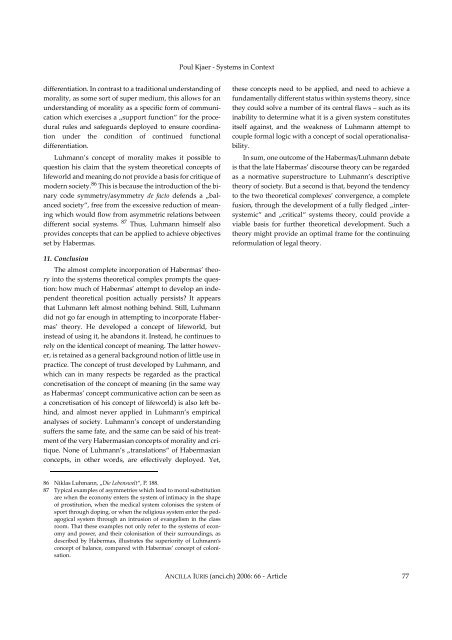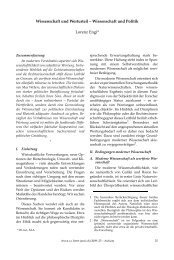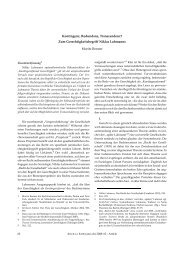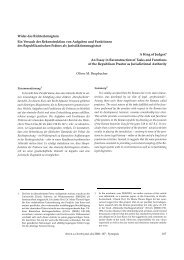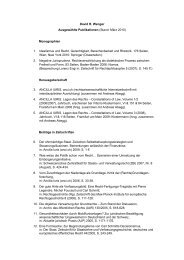On the outcome of the Habermas/Luhmann-debate
On the outcome of the Habermas/Luhmann-debate
On the outcome of the Habermas/Luhmann-debate
Create successful ePaper yourself
Turn your PDF publications into a flip-book with our unique Google optimized e-Paper software.
differentiation. In contrast to a traditional understanding <strong>of</strong><br />
morality, as some sort <strong>of</strong> super medium, this allows for an<br />
understanding <strong>of</strong> morality as a specific form <strong>of</strong> communi‐<br />
cation which exercises a „support function“ for <strong>the</strong> proce‐<br />
dural rules and safeguards deployed to ensure coordina‐<br />
tion under <strong>the</strong> condition <strong>of</strong> continued functional<br />
differentiation.<br />
<strong>Luhmann</strong>’s concept <strong>of</strong> morality makes it possible to<br />
question his claim that <strong>the</strong> system <strong>the</strong>oretical concepts <strong>of</strong><br />
lifeworld and meaning do not provide a basis for critique <strong>of</strong><br />
modern society. 86 This is because <strong>the</strong> introduction <strong>of</strong> <strong>the</strong> bi‐<br />
nary code symmetry/asymmetry de facto defends a „bal‐<br />
anced society“, free from <strong>the</strong> excessive reduction <strong>of</strong> mean‐<br />
ing which would flow from asymmetric relations between<br />
different social systems. 87 Thus, <strong>Luhmann</strong> himself also<br />
provides concepts that can be applied to achieve objectives<br />
set by <strong>Habermas</strong>.<br />
11. Conclusion<br />
The almost complete incorporation <strong>of</strong> <strong>Habermas</strong>’ <strong>the</strong>o‐<br />
ry into <strong>the</strong> systems <strong>the</strong>oretical complex prompts <strong>the</strong> ques‐<br />
tion: how much <strong>of</strong> <strong>Habermas</strong>’ attempt to develop an inde‐<br />
pendent <strong>the</strong>oretical position actually persists? It appears<br />
that <strong>Luhmann</strong> left almost nothing behind. Still, <strong>Luhmann</strong><br />
did not go far enough in attempting to incorporate Haber‐<br />
mas’ <strong>the</strong>ory. He developed a concept <strong>of</strong> lifeworld, but<br />
instead <strong>of</strong> using it, he abandons it. Instead, he continues to<br />
rely on <strong>the</strong> identical concept <strong>of</strong> meaning. The latter howev‐<br />
er, is retained as a general background notion <strong>of</strong> little use in<br />
practice. The concept <strong>of</strong> trust developed by <strong>Luhmann</strong>, and<br />
which can in many respects be regarded as <strong>the</strong> practical<br />
concretisation <strong>of</strong> <strong>the</strong> concept <strong>of</strong> meaning (in <strong>the</strong> same way<br />
as <strong>Habermas</strong>’ concept communicative action can be seen as<br />
a concretisation <strong>of</strong> his concept <strong>of</strong> lifeworld) is also left be‐<br />
hind, and almost never applied in <strong>Luhmann</strong>’s empirical<br />
analyses <strong>of</strong> society. <strong>Luhmann</strong>’s concept <strong>of</strong> understanding<br />
suffers <strong>the</strong> same fate, and <strong>the</strong> same can be said <strong>of</strong> his treat‐<br />
ment <strong>of</strong> <strong>the</strong> very <strong>Habermas</strong>ian concepts <strong>of</strong> morality and cri‐<br />
tique. None <strong>of</strong> <strong>Luhmann</strong>’s „translations“ <strong>of</strong> <strong>Habermas</strong>ian<br />
concepts, in o<strong>the</strong>r words, are effectively deployed. Yet,<br />
86 Niklas <strong>Luhmann</strong>, „Die Lebenswelt“, P. 188.<br />
87 Typical examples <strong>of</strong> asymmetries which lead to moral substitution<br />
are when <strong>the</strong> economy enters <strong>the</strong> system <strong>of</strong> intimacy in <strong>the</strong> shape<br />
<strong>of</strong> prostitution, when <strong>the</strong> medical system colonises <strong>the</strong> system <strong>of</strong><br />
sport through doping, or when <strong>the</strong> religious system enter <strong>the</strong> ped‐<br />
agogical system through an intrusion <strong>of</strong> evangelism in <strong>the</strong> class<br />
room. That <strong>the</strong>se examples not only refer to <strong>the</strong> systems <strong>of</strong> econ‐<br />
omy and power, and <strong>the</strong>ir colonisation <strong>of</strong> <strong>the</strong>ir surroundings, as<br />
described by <strong>Habermas</strong>, illustrates <strong>the</strong> superiority <strong>of</strong> <strong>Luhmann</strong>’s<br />
concept <strong>of</strong> balance, compared with <strong>Habermas</strong>’ concept <strong>of</strong> coloni‐<br />
sation.<br />
Poul Kjaer ‐ Systems in Context<br />
<strong>the</strong>se concepts need to be applied, and need to achieve a<br />
fundamentally different status within systems <strong>the</strong>ory, since<br />
<strong>the</strong>y could solve a number <strong>of</strong> its central flaws – such as its<br />
inability to determine what it is a given system constitutes<br />
itself against, and <strong>the</strong> weakness <strong>of</strong> <strong>Luhmann</strong> attempt to<br />
couple formal logic with a concept <strong>of</strong> social operationalisa‐<br />
bility.<br />
In sum, one <strong>outcome</strong> <strong>of</strong> <strong>the</strong> <strong>Habermas</strong>/<strong>Luhmann</strong> <strong>debate</strong><br />
is that <strong>the</strong> late <strong>Habermas</strong>’ discourse <strong>the</strong>ory can be regarded<br />
as a normative superstructure to <strong>Luhmann</strong>’s descriptive<br />
<strong>the</strong>ory <strong>of</strong> society. But a second is that, beyond <strong>the</strong> tendency<br />
to <strong>the</strong> two <strong>the</strong>oretical complexes’ convergence, a complete<br />
fusion, through <strong>the</strong> development <strong>of</strong> a fully fledged „inter‐<br />
systemic“ and „critical“ systems <strong>the</strong>ory, could provide a<br />
viable basis for fur<strong>the</strong>r <strong>the</strong>oretical development. Such a<br />
<strong>the</strong>ory might provide an optimal frame for <strong>the</strong> continuing<br />
reformulation <strong>of</strong> legal <strong>the</strong>ory.<br />
ANCILLA IURIS (anci.ch) 2006: 66 ‐ Article 77


